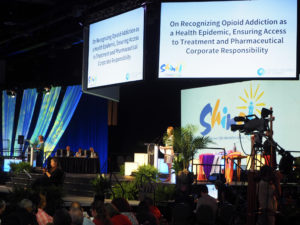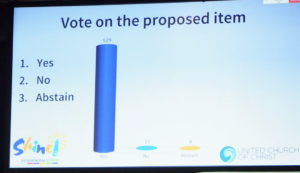CHHSM Resolution On Recognizing Opioid Addiction as a Health Epidemic Overwhelmingly Approved by UCC’s General Synod

Katie McCloskey of United Church Funds introduces the CHHSM-sponsored resolution to delegates.
Delegates to the United Church of the Christ’s Thirty-Second General Synod, meeting in Milwaukee, Wis., today (June 22) approved a resolution recognizing opioid addiction as a health epidemic, ensuring access to treatment and pharmaceutical corporate responsibility. The Resolution of Witness passed with 97 percent — 629 votes — in favor, 11 opposed, and 8 abstaining.
The resolution was sponsored by CHHSM. CHHSM member organizations throughout the country daily work to provide treatment to addicted patients, to help reunite families torn apart by addiction, and to help them navigate coverage for treatment.
In introducing the resolution during the third plenary of Synod, Katie McCloskey, director of social responsibility for United Church Funds, said, “UCF and I support the goals of this resolution and believe that the UCC should as well. So many of us have stories of loved ones who have almost lost everything after becoming addicted to prescription opioids — having been prescribed an opioid for a tweaked muscle or a bulging disc. Grief, fear, distrust and anger rule when a family member or friend is in the throes of opioid addiction.”
While McCloskey noted the positive side of opioid treatment, especially for end-of-life care and certain chronic conditions, she cited how this drug epidemic, in its origins, is different from the systemic drug addiction that has already devastated portions of American society.

The resolution was approved by 97 percent of voting delegates.
“This opioid epidemic was borne of multibillion-dollar corporations, with all the itinerant finance and support,” McCloskey said, “lying about the dependency profiles of the drugs they were making and creating an ever-expanding list of maladies for which these drugs should be prescribed.”
The CHHSM-sponsored resolution urges all members and setting of the church to:
- Recognize opioid addiction as a health epidemic.
- Call on Congress to increase Medicare and Medicaid funding to treat opioid addiction.
- Recognize that opioid addiction does not determine a person’s worth.
- Invite public discourse on the need for just and equitable treatment to lessen the stigma associated with asking for help.
- Use all manner of activism — including shareholder activism of opioid pharmaceutical manufacturers and distributors — to hold accountable those who irresponsibly market, distribute, or prescribe opioids or criminalize those who become addicted.
“We stand with our member organizations and the whole of the United Church of Christ in demanding justice for all people, for access to health care and addiction treatment, and in requiring large corporations to behave in socially responsible ways in the marketing and distribution of potentially dangerous pharmaceuticals,” said Michael J. Readinger, CHHSM president and CEO, following the vote. “CHHSM will continue to show Love of Neighbor, Love of Children, and Love of Creation through its advocacy work on behalf of all God’s people.”
Join Our Mailing LIst
"*" indicates required fields
Follow on Facebook
Hoyleton’s ‘Be the Light’ Honors Volunteers, Raises $94,000 for Programming - CHHSM
www.chhsm.org
Hoyleton (Ill.) Youth and Family Services lit up the room Feb. 28 during its 42nd Annual Hoyleton Honors celebration. With the theme of “Be the Light,” Hoyleton highlighted the numerous ways the o...